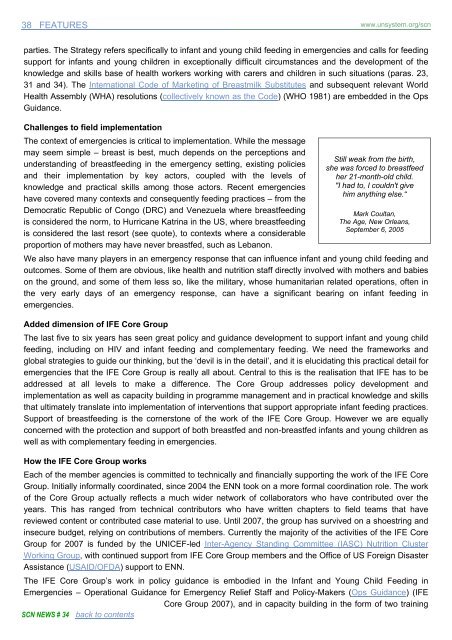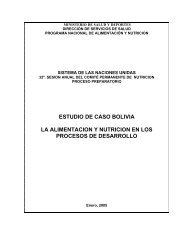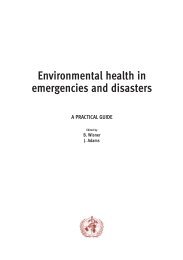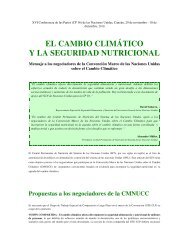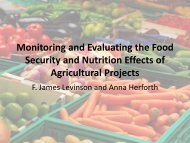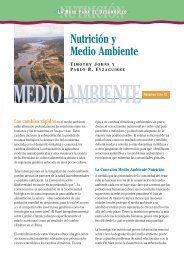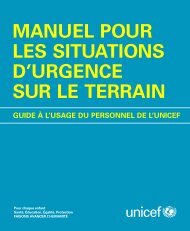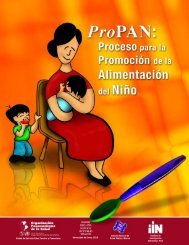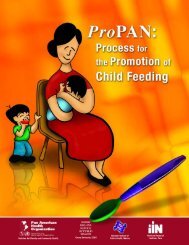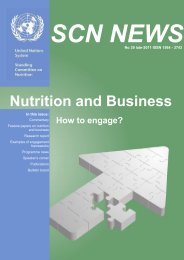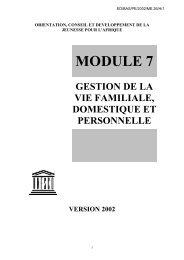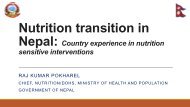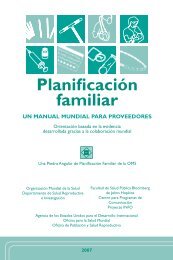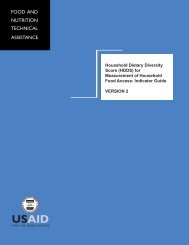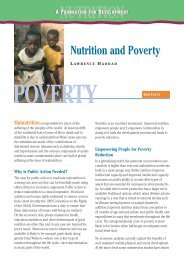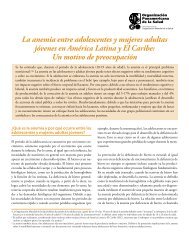SCN News No 34 - UNSCN
SCN News No 34 - UNSCN
SCN News No 34 - UNSCN
Create successful ePaper yourself
Turn your PDF publications into a flip-book with our unique Google optimized e-Paper software.
38 FEATURES<br />
www.unsystem.org/scn<br />
parties. The Strategy refers specifically to infant and young child feeding in emergencies and calls for feeding<br />
support for infants and young children in exceptionally difficult circumstances and the development of the<br />
knowledge and skills base of health workers working with carers and children in such situations (paras. 23,<br />
31 and <strong>34</strong>). The International Code of Marketing of Breastmilk Substitutes and subsequent relevant World<br />
Health Assembly (WHA) resolutions (collectively known as the Code) (WHO 1981) are embedded in the Ops<br />
Guidance.<br />
Challenges to field implementation<br />
The context of emergencies is critical to implementation. While the message<br />
may seem simple – breast is best, much depends on the perceptions and<br />
understanding of breastfeeding in the emergency setting, existing policies<br />
and their implementation by key actors, coupled with the levels of<br />
knowledge and practical skills among those actors. Recent emergencies<br />
have covered many contexts and consequently feeding practices – from the<br />
Democratic Republic of Congo (DRC) and Venezuela where breastfeeding<br />
is considered the norm, to Hurricane Katrina in the US, where breastfeeding<br />
is considered the last resort (see quote), to contexts where a considerable<br />
proportion of mothers may have never breastfed, such as Lebanon.<br />
Still weak from the birth,<br />
she was forced to breastfeed<br />
her 21-month-old child.<br />
"I had to, I couldn't give<br />
him anything else.“<br />
Mark Coultan,<br />
The Age, New Orleans,<br />
September 6, 2005<br />
We also have many players in an emergency response that can influence infant and young child feeding and<br />
outcomes. Some of them are obvious, like health and nutrition staff directly involved with mothers and babies<br />
on the ground, and some of them less so, like the military, whose humanitarian related operations, often in<br />
the very early days of an emergency response, can have a significant bearing on infant feeding in<br />
emergencies.<br />
Added dimension of IFE Core Group<br />
The last five to six years has seen great policy and guidance development to support infant and young child<br />
feeding, including on HIV and infant feeding and complementary feeding. We need the frameworks and<br />
global strategies to guide our thinking, but the ‘devil is in the detail’, and it is elucidating this practical detail for<br />
emergencies that the IFE Core Group is really all about. Central to this is the realisation that IFE has to be<br />
addressed at all levels to make a difference. The Core Group addresses policy development and<br />
implementation as well as capacity building in programme management and in practical knowledge and skills<br />
that ultimately translate into implementation of interventions that support appropriate infant feeding practices.<br />
Support of breastfeeding is the cornerstone of the work of the IFE Core Group. However we are equally<br />
concerned with the protection and support of both breastfed and non-breastfed infants and young children as<br />
well as with complementary feeding in emergencies.<br />
How the IFE Core Group works<br />
Each of the member agencies is committed to technically and financially supporting the work of the IFE Core<br />
Group. Initially informally coordinated, since 2004 the ENN took on a more formal coordination role. The work<br />
of the Core Group actually reflects a much wider network of collaborators who have contributed over the<br />
years. This has ranged from technical contributors who have written chapters to field teams that have<br />
reviewed content or contributed case material to use. Until 2007, the group has survived on a shoestring and<br />
insecure budget, relying on contributions of members. Currently the majority of the activities of the IFE Core<br />
Group for 2007 is funded by the UNICEF-led Inter-Agency Standing Committee (IASC) Nutrition Cluster<br />
Working Group, with continued support from IFE Core Group members and the Office of US Foreign Disaster<br />
Assistance (USAID/OFDA) support to ENN.<br />
The IFE Core Group’s work in policy guidance is embodied in the Infant and Young Child Feeding in<br />
Emergencies – Operational Guidance for Emergency Relief Staff and Policy-Makers (Ops Guidance) (IFE<br />
Core Group 2007), and in capacity building in the form of two training<br />
<strong>SCN</strong> NEWS # <strong>34</strong> back to contents


